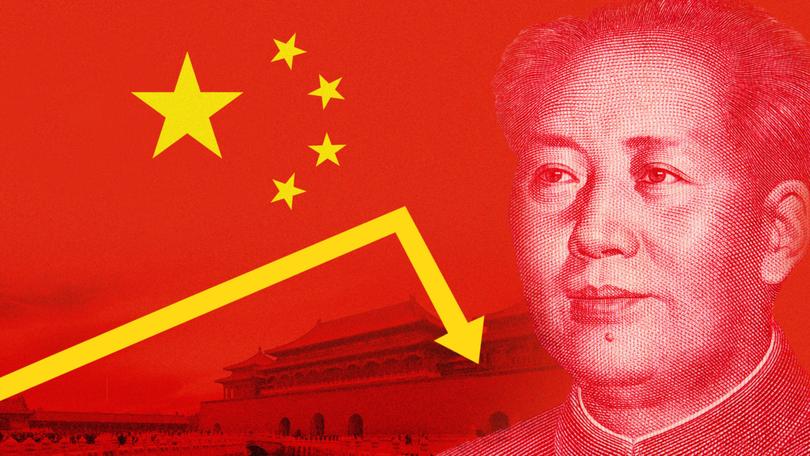The Economist: China’s leaders face miserable economic growth figures during ‘third plenum’ gathering
The country’s leaders are gathering at the ‘third plenum’ to discuss the long-term agenda. Unfortunately, a souring reality has intruded.

The Jingxi Hotel in Beijing is known for its home-made yoghurt — and for hosting some of the most important meetings in the history of the Chinese Communist Party. They include the “third plenum” of 1978, which confirmed Deng Xiaoping’s rise to power and the opening of the Chinese economy.
The country’s leaders are now gathering for another “third plenum” in this closely guarded venue from July 15-18. They should savour their yoghurt. Because outside the hotel walls, the economy is turning sour again.
Figures released on the opening day of the meeting showed that the economy grew by 4.7 per cent in the second quarter, compared with a year earlier.
Sign up to The Nightly's newsletters.
Get the first look at the digital newspaper, curated daily stories and breaking headlines delivered to your inbox.
By continuing you agree to our Terms and Privacy Policy.The number was both weaker than expected and slower than the previous quarter’s figure, when growth seemed to be stabilising. It puts the government’s official growth target for this year — around 5 per cent — in doubt.
Beneath the headline figure, the data were even worse. Nominal GDP, which makes no adjustment for inflation, again grew more slowly than the price-adjusted figure. The gap implies that prices across the economy continue to fall. In fact, by this measure, China has suffered its fifth quarter of deflation in a row.
Ever since China’s housing slump began in the middle of 2021, economists have worried that the world’s second-biggest economy might follow in the footsteps of Japan, which suffered a lost two decades of deflation after its asset bubbles burst.
By some measures, China is a fast follower.
Japan did not enter the fifth quarter of its deflationary spell until the end of 1995, over four years after its property market peaked. In Japan the pattern of falling prices persisted, with few interruptions, for another 18 years.
In both Japan then and China today, deflation is a symptom of lacklustre demand. China’s retail sales, for example, grew by only 2 per cent in nominal terms in June, compared with a year earlier. Vehicle sales shrank by more than 6 per cent.
The slump in property rumbles on. In particular, the push to finish half-built homes, a government priority, seems to have lost momentum. The amount of floorspace completed by developers in June was almost a third less than a year earlier.
Just as deflation reflects weak spending, it can also cause it.
Firms will hesitate to borrow and invest if falling prices mean that the money they must repay is worth more, in real terms, than the money they borrowed. In response to slowing credit growth, China’s central bank could cut interest rates.
But it worries that lower rates would weaken China’s currency and erode the profitability of its banks.
The central bank’s recent announcements have instead focused on refinements to its policy-making apparatus, helping it prop up bond yields and keep interest rates in a narrower range. It has been more active in sharpening its tools than using them.
Could policy signals from the third plenum come to the rescue?
Although the meeting, which takes place only twice a decade, is supposed to be about long-term reform, not short-term stimulus, the distinction between the two is not absolute.
A solution to some of China’s structural shortcomings could help alleviate some of its more immediate problems, too.
Consumer spending, for example, is chronically weak in China.
The reasons include China’s thin social-safety net and its hukou system of household registration, which denies migrant workers equal access to public services in the cities where they work.
Both of these structural flaws oblige some of China’s poorest households to scrimp and save for a rainy day, inhibiting one source of consumer spending. If the third plenum credibly signalled faster hukou reform, fatter state pensions and improved health care, it might help lift consumers’ gloomy outlook.
On the other hand, some structural reforms could make China’s cyclical problems worse. Local governments, for example, need new sources of revenue to replace dwindling proceeds from selling land.
One answer is an annual tax on the value of property. But introducing such a tax now would seem perverse in the midst of a property slump.
Another proposal discussed in recent months is expanding China’s consumption tax, which falls mainly on luxuries, like jewellery and cars, and sinful goods, like booze and cigars. Again, expanding the consumption tax would only further depress weak retail sales.
Over the next few days and months, China’s leaders need to keep this balance in mind. Any long-term economic reforms emanating from the Jingxi hotel must be sweetened with further stimulus spending in the short term. The hotel’s famous yogurt reportedly tastes even better with an extra sprinkling of sugar.
